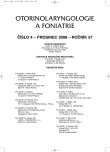-
Medical journals
- Career
Cetuximab in the Salvage Protocol for Local-Regional Advanced Carcinomas of Head and Neck: First Clinical Experience and Possibilities of Research in Predicting Efficiency of this Treatment
Authors: J. Neuwirthová; R. Kostřica; Z. Mechl; P. Smilek
Authors‘ workplace: Klinika otorinolaryngologie a chirurgie hlavy a krku LF MU a FN, Brno přednosta prof. MUDr. R. Kostřica, CSc.
Published in: Otorinolaryngol Foniatr, 57, 2008, No. 4, pp. 226-229.
Category: Comprehensive Reports
Overview
The integration of EGFR inhibitors to the treatment of head and neck cancers means considerable advancement in oncology. Extracellular inhibitors show the effectiveness in the treatment of head and neck cancers. But only cetuximab in a combination with high dose radiation therapy is registered in the Czech Republic for locoregionally advanced diseases. The research of predictive markers is being carried out all over the world together with the EGFR inhibitors treatment.
Key words:
head and neck cancer, targeted therapy, EGFR inhibitor, cetuximab, EGFR, mutation, predictive marker.
Sources
1. Bonner, J. A., Harari, P. M., Giralt, J. et al.: Radio - therapy plus cetuximab for squamous-cell carcinoma of the head and neck. New England Journal of Medicine, 354, 2006, s. 567-578.
2. Carpenter, G., Cohen, S.: Epidermal growth factor. J. Biol. Chem., 265, 1990, s. 7709-7712.
3. Dillman, R. O.: Human antimouse and antiglobulin responses to monoclonal antibodies. Antibody Immunocon Radiopharm, 3, 1990, s. 1-15.
4. Erjala, K., Sundwall, M., Junttila, T. T. et al.: Signaling via ErB2 and ErbB3 associates with resistance and epidermal growtg factor receptor (EGFR) amplification with sensitivity to EGFR inhibitor gefitinib in head and neck squamous cell carcionoma cells. Clinical Cancer Research, 12, 2006, s. 4103-4111.
5. Grandis, J. R., Zeng, O., Tweardy, D. J.: Retinoic acid normalizes the increased gene transcriptiono rate of TGF-alpha and EGFR in head and neck cancer cell lines. Nat. Med., 2, 1996, s. 237-240.
6. Gullick, W. J.: Prevalence of aberrant expression of the epidermal growth factor recpetor in human cancers. Br. Med. Bull., 47, 1991, s. 87-98.
7. Kalyankrishna, S., Grandis, J. R.: Epidermal growth factor receptor biology in head and neck cancer. J. Clin. Oncol., 24, 2006, s. 2666-2672.
8. Kijima, T., Niwa, H., Steinman, R. A. et al.: STAT3 activation abrogates growth factor dependence and contributes to head and neck squamous cell carcinoma tumor growth in vivo. Cell Growth, 13, 2002, s. 355-362.
9. Kurai, J., Chikumi, H., Hashimoto, K. et al.: Antibody-dependent cellular cytotoxicity mediated by cetuximab against lung cancer cell lines. Clinical Cancer Research, 13, 2007, s. 1552-1561.
10. Sok, J. C. et al.: Mutant epidermal growth factor receptor (EGFRvIII) contributes to head and neck cancer growth and resistance to EGFR targeting. Clinical Cancer Research, 12, 2006, s. 5064-5073.
11. Trojanec, R., Špačková, K., Cwiertka, K. et al.: Amplifikace genu Her-2/neu: molekulární, buněčné a klinické aspekty. Klinická farmakologie a farmacie, 16, 2002, s. 23-29.
12. Viloria-Petit, A. M., Crombet, T., Jothy, S. et al.: Acquired resistance to the antitumor effect of epidermal growth factor receptor-blocking antibodies in vivo: a role for altered tumor angiogenesis. Cancer Res., 61, 2001, s. 5090-5101.
13. Yarden, Y., Sliwkowski, M. X.: Untangling the ErbB signalling network. Nat. Rev. Mol. Cell Biol., 2, 2001, s.127-137.
Labels
Audiology Paediatric ENT ENT (Otorhinolaryngology)
Article was published inOtorhinolaryngology and Phoniatrics

2008 Issue 4-
All articles in this issue
- Czech Speech Audiometry – Development of New Tests
- Relation of PTA and SRT (Pure Tone Average - Speech Recognition Threshold)
- Surgical Therapy of Primary Tumors of Orbit
- Phonosurgical Treatment of Glottic Insufficiency
- Importance of PET for Diagnostics of Persistence of Neck Metastases after Therapy Under the Salvage Protocol in Advanced Head and Neck Carcinomas
- Prevention of Side Confusion in Surgery at the ORL Clinic
- Vestibular Schwannoma
- Cetuximab in the Salvage Protocol for Local-Regional Advanced Carcinomas of Head and Neck: First Clinical Experience and Possibilities of Research in Predicting Efficiency of this Treatment
- Pemphigus Vulgaris
- Sarcoidosis Associated with Papillary Carcinoma of Thyroid Gland and Parathyroid Adenoma
- Cutaneous T-cell Lymphoma of Head and Neck
- Primary Squamous-Epithelial Carcinoma
- Otorhinolaryngology and Phoniatrics
- Journal archive
- Current issue
- Online only
- About the journal
Most read in this issue- Vestibular Schwannoma
- Pemphigus Vulgaris
- Relation of PTA and SRT (Pure Tone Average - Speech Recognition Threshold)
- Primary Squamous-Epithelial Carcinoma
Login#ADS_BOTTOM_SCRIPTS#Forgotten passwordEnter the email address that you registered with. We will send you instructions on how to set a new password.
- Career

